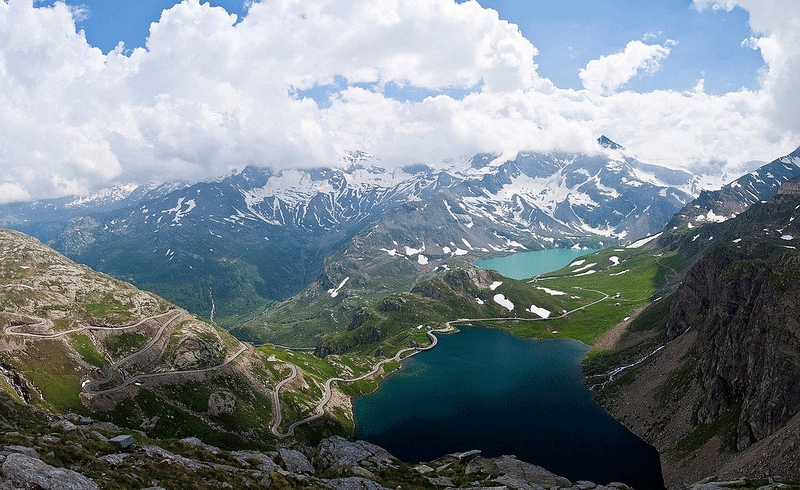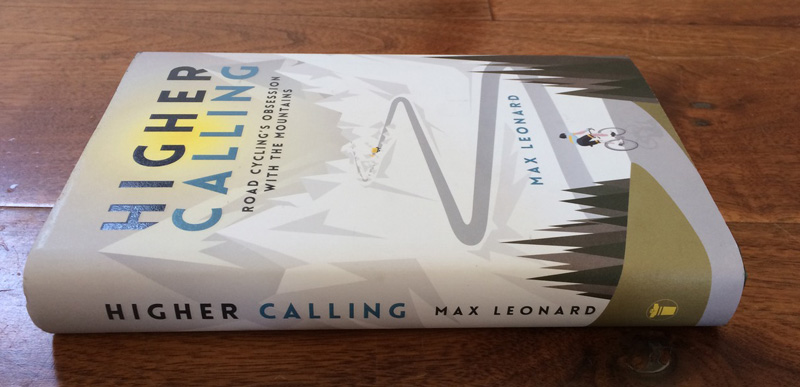Higher Calling, Road Cycling’s Obsession with the Mountains by Max Leonard
As the Tour de France races across the Pyrenees do you want to try these roads for yourself? Perhaps but maybe the Tour’s passage is only a part of it. The scenery, the challenge, perhaps the hope of better weather or a week away from it all are part of the attraction.
Why do the mountains hold such an important place in cycling’s iconography, it’s myths and travel business? This book sets out to explore the mountains, not the roads but our approach to them.
Start riding a bike as a child and one of the pleasures is going downhill. You’ll ride or even walk up a hill so you can speed down. Keep going as an adult and maybe there’ll come a point when it’s the climb that becomes more interesting and Leonard sets to explore why.
The first thing is the structure of the book. This is not the linear and chronological tale you might expect starting with early history of mountain passes, maybe Hannibal, the military need for the mountain passes, the advent of tourism, the Tour de France climbing the Tourmalet for the first time and then the establishment of the myths and legends as well as the mountains becoming the decisive terrain for the race. Instead the book is much more like a collection of essays and articles with a shared theme of the mountains and climbing with the author undertaking various adventures.
It begins with Leonard visiting the crew of workers clearing the snow off the Col de la Bonette in the spring. This may not explain why many are drawn to the mountains but it tells the tale of the mountain itself, especially the road. It’s too easy to assume that a road is just there but it takes a lot of work to create and maintain, especially in the face of such harsh elements.
The next chapter is about taking a 2CV van into the mountains, again the Bonette and its height and location has a particular appeal to Leonard. The primitive van, with its gasping engine and drum brakes, seems to illustrate that it’s only in recent times that the motorcar has been able to drive over the mountains with ease and that back in the days when cyclists first started venturing into the mountains it was folly for everyone. Tourism in the mountains is a recent thing and cycling over the passes is even more novel. This style sets the tone for all the other chapters as Leonard explores the themes of the mountains with a mix of personal adventures, history and anecdote and there are some black and white photos added to the pages for illustration.

There’s a certain conceit for road cyclists, the idea of “getting away from it all” is entirely dependent on the road itself. Far from embracing nature we need a strip of tarmac and Leonard explains some of the history behind the road building in the Alps of huge gangs of workers toiling on the slopes for years or the work involved to keep the roads open from ploughing snow to plugging potholes or clearing rocks. In order for you to have that moment away from the maddening crowd it has probably taken an army to make this happen. Leonard covers this aspect as well as more classic features such as the great climbers including an interview with Federico Bahamontes as the “Eagle of Toledo” holds court over the state of the sport and guess what, it was better in his day. There’s insight from Cannondale-Drapac pro Joe Dombrowski with an account of the 2016 Giro and Dombrowski’s attempts to win the final mountain stage and this covers some of the tactics involved but feels dated already, as if too specific moment in a book that sweeps across history and motivations but it’s an inside take on the tactics and Dombrowski is, in a way, like the shepherds who make their way to the mountains in summer.
Leonard diverts from the cycling to explore rural life high in the Alps and to discuss pastoral life of shepherds, from rural depopulation and changing consumer habits to the increasing threat of the wolves. What’s this got to do with cycling? A priori little but ride in these mountains and you are enjoying a landscape shaped by the shepherds and the flocks, you are using a road that was probably an ancestral path of merchants, smugglers or the armies and the sound of cowbells may sound like a tourist attraction but it’s all too real, the preservation of tradition and a deterrent to lupine predators. It’s all to easy to ride up a mountain pass having driven to the start, stare at your GPS on the way up and go home hours later with little contribution to the locals beyond an espresso consumed along the way. Leonard’s reminder of the real life here is a good read and if you didn’t open the book expecting this you’ll close it satisfied you read it.
There’s a section on Strava and Everesting and the idea of climbing whatever is to hand. Is this same as riding in the mountains? Perhaps not but you have to make the most of your geography. Both Strava and Everesting, the idea of riding up and down a road to accumulate the same vertical gain in a day as the Himalayan mountain, feel like poor equivalents though, relying on repetition or synthetic segments rather than the majesty of a mountain pass.
The Verdict
An enjoyable read that will enhance your knowledge of the mountains, perhaps you know about Albert Steinès and his telegraph or René Vietto’s toe but you probably won’t know how snow is cleared off the road or why Strava was started… or vice versa. Leonard’s style is easy to read, he places himself in the story, he does not simply report what he finds but tells the tale of how he found about these things, readers of his excellent Lanterne Rouge will be familiar with this. Why the mountains? Leonard explores plenty of reasons. You might agree but you might have your own motivations. Ultimately there’s an extra chapter to add at the end: yours and what you feel about the mountains, they’re place in your riding, the sport and more.
- Note: a digital copy of this book was sent free for review. It is published in hardback and e-book by Random House
- Photo of the Colle del Nivolet by Flickr’s Muneaki
More book reviews at inrng.com/books


ThNks for the excellent review. I think I know what to bring on my next holiday. Good that they do e book version as well. As much I would enjoy the physicality of a printed book, bring them on board whilst with two little kids are just not practical. Maybe I don’t love reading enough to overcome such adversity.
Not to be confused with (or otherwise happily confused with) “A Higher Call” by Adam Markos, the story of a German fighter pilot and American number pilot in WWII, their encounter and subsequent reunion. Well worth a read but probably only has France in common with INRNG’s review… and I’ll sit down now.
very interesting. my personal season normally revolves around climbing some high mountain passes, where reaching the end of the treeline is kind of a salvation. and there always have to be new ones.
i wonder where this attraction comes from. when you really want to get into the rawness, majesty and solitude of the mountains its actually better to go by foot.
maybe its also the speed with which you climb and descend between the different worlds?
anyway i really pity people that have to live in such flat places like amsterdam for example.(where i also lived briefly)
btw: my next “mount doom” to climb :
http://www.quaeldich.de/paesse/grosser-oscheniksee/?BildID=12448
The last time I was in Amsterdam, they seemed to be doing ok.